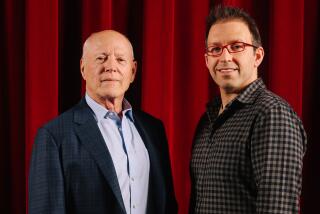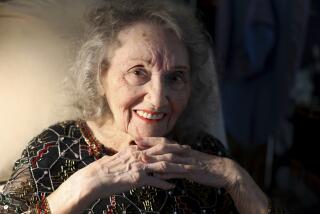Magic Loomed Large in World of Orson Welles
- Share via
A largely unrecognized part of the late Orson Welles’ life was a deep and abiding dedication to the art of theatrical conjuring.
“Welles loved magic more than anything--his films, the stage, anything,” said John Gaughan, who had just completed building about 40% of the illusions that were to be used in a projected television magic special.
Gaughan, who designs and constructs magic for the leading magicians of the world in his San Fernando Valley workshop, had accompanied Welles to the studio of the Merv Griffin show the night Welles died. With them was Jim Steinmeyer, a young creator of magical effects and director.
Welles had performed a mental effect with playing cards, devised by Steinmeyer, on the Griffin show. Steinmeyer had been working closely with Welles on the magic special for the past five years. There is a strong possibility that the portion of the Welles show that has already been filmed will be aired on network TV.
Rita Hayworth Assisted
The actor with the resonant voice who mesmerized audiences as Citizen Kane, the Shadow and the Third Man was married to actress Rita Hayworth when I first saw him perform magic. I remember sitting entranced in a tent in Hollywood during the early 1940s watching Welles do magic in his “Mercury Wonder Show.”
Miss Hayworth was his “box jumper,” as a magician’s assistant is called when she is subjected to being sawed in half, pierced with swords, vanished and otherwise theatrically abused. During other performances on the same show, Marlene Dietrich was Welles’ box jumper. “The Mercury Wonder Show,” under the auspices of the United Service Organization, had toured military camps as well. Actor Joseph Cotton had acted as a Welles assistant.
William Larsen Jr., president of Hollywood’s Magic Castle, also remembers with delight the “Mercury Wonder Show.” Larsen’s late father, William, a Los Angeles attorney and skilled magician, at the time owned Thayer’s Studio of Magic. The Thayer workshops had provided almost all of Welles’ magic apparatus.
Sawing Ladies in Half
“Dad rebuilt the show several times,” Larsen told me, explaining that Welles’ habit on stage was to toss away dramatically a piece of equipment when he had finished with it. An assistant had been cued to catch it. If the assistant was off in his positioning, the apparatus crashed to the stage floor. And so back to Thayer’s it went for repairs.
Comparing recollections of the show, Larsen and I agreed that a highlight was when Welles sawed either Dietrich or Hayworth, laid out in a box, into halves using a lumberman’s saw. While engaged in the sawing, Welles smoked a big cigar. His head wreathed in smoke, the cigar between his lips, Welles would roll his eyes wickedly at the audience. That was magic-show acting at its best!
When complimented on his magic, Welles was inclined to deprecate his skill as a magician, remarking that it was just a lot of “boxes and birds and anybody can do it.”
This modesty was a kind of trick in itself, a form of misdirection that concealed Welles’ lifelong, keen and broad interest in the art and history of legerdemain, and his very real skill in its performance. His skill, however, was secondary to the attribute that made him a fine conjurer. He was a great actor, following the tenet of the popular 19th-Century magician Jean Robert-Houdin, who said the only successful magician was an actor playing the part of a magician.
Performed Before Royalty
Steinmeyer said Welles’ fascination with magic was kindled as a boy when his godfather gave him a magic set. Magic became woven into the fabric of his life. He performed magic whenever he had the opportunity: three times before British royalty, on the New York stage in the Federal Theater’s production of Christopher Marlowe’s “Faustus,” in Germany during his “Evening with Orson Welles,” on TV talk shows. He reveled in its performance.
Curiously, many lay people and a surprising number of magicians did not recognize Welles as primarily a magician. This disappointed him, for Welles regarded himself as such, according to Steinmeyer. The knowledgeable movie people, however, were awed by his magic. His creative innovations, employing advanced techniques of theatrical illusions with film, proved to them that Welles was truly a master magician.
More to Read
The biggest entertainment stories
Get our big stories about Hollywood, film, television, music, arts, culture and more right in your inbox as soon as they publish.
You may occasionally receive promotional content from the Los Angeles Times.










